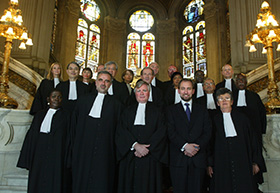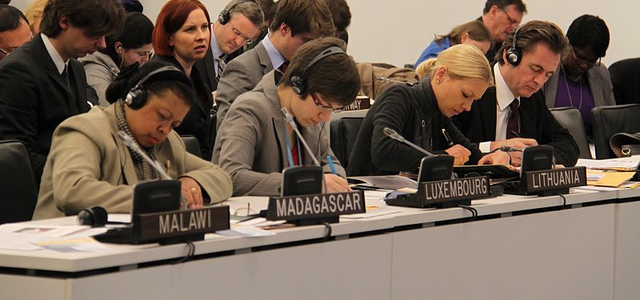In December 2011, the Assembly of States Parties (ASP), the governing body of the International Criminal Court, will elect several Court officials, including 6 new judges tasked to render judments on cases of genocide, war crimes, and crimes against humanity. These judicial elections represent the most significant change to the composition of the Court’s bench in recent years: a third of the current bench, consisting of a total of 18 judges, will turn over.

In a previous post, Tony Fleming and I addressed the importance of the minimum voting requirements – needed to ensure a gender and geographical balance on the judicial bench – for these elections. Since that post, the official nomination period has opened and a number of candidates have been put forward by states, necessitating a review of these requirements and where nominations presently stand.
Nominations of Candidates
The ASP is currently composed of 117 states that are party to the Rome Statute, the founding treaty of the ICC. Each member of the ASP – that is, every State Party – may nominate one candidate for any given election. States that are in the process of ratifying or acceding to the Rome Statute can provisionally nominate candidates but their nominations will not stand unless they complete the process by the deadline of 2 September 2011.
The judges to be elected will serve for nine years, in accordance with Article 36(9) of the Rome Statute, although they may not start their terms immediately. There are currently six active investigations before the Court and it has made public that it is examining eight other situations. In addition, the Court has issued 18 arrest warrants, two of which are for sitting heads of state, three trials are ongoing and another is in the Appeals phase.
Candidates do not need to be nominated by their home government; states may nominate candidates from any other ASP member state. For instance, during the first ICC elections in 2003, Panama nominated Costa Rican national Elizabeth Odio Benito. But while candidates of the same nationality may be nominated, no two elected judges may be nationals of the same state.
Ensuring Regional Representation
The Rome Statute calls for the ICC bench to reflect the full geographic representation of the Court’s member states. To facilitate this, judges are elected from among the five regional groups recognized by the United Nations: the African Group, the Asian Group, the Eastern European Group, the Latin American and Caribbean Group (GRULAC) and the Western European and Others Group (WEOG).
There are currently fourteen nominations for the six available judicial vacancies, most from African, Western European and Eastern European states. Several additional nominations were anticipated to be put forward prior to the deadline, particularly from Latin America.
At the moment, the Asian Group is the most underrepresented region at the Court; only two of the 18 current judges are from the region, specifically from Japan and South Korea. Despite this, there are no MVRs to fulfill for the Asian Group during this election. However, civil society continues to call on Asia to ensure an increased representation at the Court, including by nominating candidates to hold judicial and other positions.
So far, there are two nominations from the Asia Region: Philippines nominated candidate Miriam Defensor-Santiago and Cyprus, George Serguides.

Included in the Asian Group are states from the Middle East, and given the recent momentum towards governance and the rule of law in the Middle East and North Africa, it is a monumental step that Tunisia has nominated a candidate, and more so if he were elected to the Court.
Current members of the League of Arab States that are also parties to the Rome Statute- apart from Tunisia- are Comoros, Djibouti and Jordan. As there is no Arab group of states per se in the UN system, these four governments can nominate candidates through the Asian or African groups. Ajmi Bel Hay Hamouda was nominated through the African group. However, as previously elucidated, any state party may nominate a candidate from any other state party.
Challenge: Minimum Voting Requirements
In order to be elected, candidates must receive a 2/3 majority of votes from the states parties present and voting. But to ensure adequate representation and a balance of regional groups, gender, and different judicial expertise and experience, the Rome Statute stipulates that elections must observe certain minimum voting requirements, or MVRs. These will not in any way restrict who may be nominated; rather, they will structure ICC elections to ensure the bench represents these required balances.
In terms of regional distribution for the December 2011 elections, the minimum requirements presently stand as such: States Parties will be required to vote for at least 2 judges from the Latin American and Caribbean Group (GRULAC) and 1 from the Eastern European Group in the early rounds of voting. In order for this minimum requirement to hold, the Rome Statute further stipulates that states must nominate twice the minimum number of candidates that must be elected from the region for which there is an MVR. Therefore, in order to uphold the election MVRs, states will need to nominate 4 candidates from the GRULAC region and 2 candidates from the Eastern European Group.
The GRULAC MVRs have not yet been met; therefore it is important that states nominate candidates from Latin America and the Caribbean.
In terms of the Eastern European group, the MVRs were met with the nomination of two candidates: one from Poland and one from the Czech Republic.
In addition, in terms of legal competence and experience, States Parties must vote for 3 candidates from List A, which consists of experts with experience in criminal law and procedure, in order to fulfill the MVRs. For the upcoming elections, there are no MVRs for List B, candidates with expertise and experience in international humanitarian law and the law of human rights. Nevertheless, states may still nominate such candidates and designate them for inclusion on List B.
So far, 12 candidates have been nominated for List A, thereby fulfilling the MVRs for legal competency and experience, and two candidates were nominated for List B.
To meet the gender MVRs, states must vote for at least 2 male candidates; there is no requirement to vote for female candidates in this election as eight of the 12 remaining justices are female. However, this does not preclude states from nominating women particularly as there are numerous qualified female judges. In addition, a lack of female candidates will throw the balance to males.
More Nominations Needed
The election of judges at the ICC is important to ensure the continued credibility, transparency and impartiality of the institution; the December 2011 judicial elections will be crucial to the functioning and legitimacy of the Court. Keeping inmind that it is a young institution, it will be important to ensure that it is a merit-based election process that avoids the questionable practices criticized in creating prior tribunals, at both national and international levels.
Governments, international, and regional institutions also have a role to play in guaranteeing the transparency and caliber of the process. Likewise, civil society has been and will continue to be crucial in ensuring that the most highly qualified judges are nominated and that states uphold a merit-based process.
These elections will affect the lives of millions of people worldwide; it is vital to take the ICC election process seriously.



One thought on “A Challenge for States: Electing Judges to End Global Impunity”